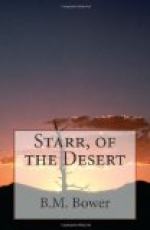First it brought the gorgeous sunset, that made him think of Helen May just because it was beautiful and because she would probably be gazing up at the crimson and gold and all the other elusive, swift-changing shades that go to make a barbaric sunset. Sure, she would be looking at it, unless she was still talking to that man, he thought jealously. It fretted him that he did not know who the fellow was. So he turned his thoughts away from the two of them.
Next came the dusk, and after that the stars. There was no moon to taunt him with memories, or more practically, to light for him the near country. With the stars came voices from the porch of the adobe house below him. Estan’s voice he made out easily, calling out to Luis inside, to ask if he had shut the colt in the corral. The senora’s high voice spoke swiftly, admonishing Luis. And presently Luis could be seen dimly as he moved down toward the corrals.
Starr hated this spying upon a home, but he held himself doggedly to the task. Too many homes were involved, too many sons were in danger, too many mothers would mourn if he did not play the spy to some purpose now. This very home he was watching would be the happier when he and his fellows had completed their work and the snake of intrigue was beheaded just as Helen May had beheaded the rattler that afternoon. This home was happy now, under the very conditions that were being deplored so bombastically in the circulars he had read. Why, then, should its peace be despoiled because of political agitators?
Luis put the colt up for the night and returned, whistling, to the house. The tune he whistled was one he had learned at some movie show, and in a minute he broke into singing, “Hearts seem light, and life seems bright in dreamy Chinatown.” Starr, brooding up there above the boy, wished that Luis might never be heavier of heart than now, when he went singing up the path to the thick-walled adobe. He liked Luis.
The murmur of voices continued, and after awhile there came plaintively up to Starr the sound of a guitar, and mingling with it the voice of Luis singing a Spanish song. La Golondrina, it was, that melancholy song of exile which Mexicans so love. Starr listened gloomily, following the words easily enough in that still night air.
Away to the northwest there gleamed a brighter, more intimate star than the constellation above. While Luis sang, the watcher in the rocks fixed his eyes wistfully on that gleaming pin point of light, and wondered what Helen May was doing. Her lighted window it was; her window that looked down through the mouth of the Basin and out over the broken mesa land that was half desert. Until then he had not known that her window saw so far; though it was not strange that he could see her light, since he was on the crest of a ridge higher than any other until one reached the bluff that held Sunlight Basin like a pocket within its folds.




